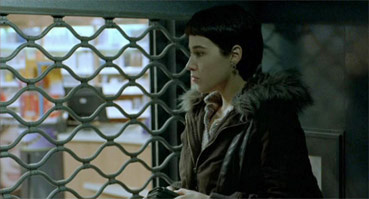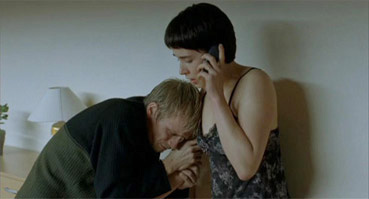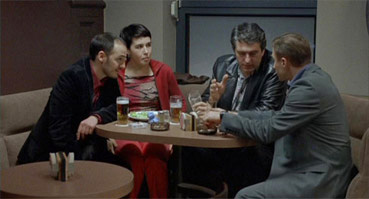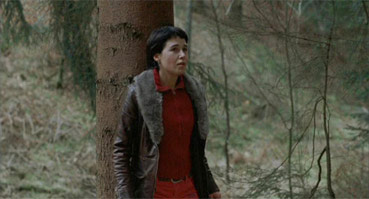| "I don't want to screw up on this deal. I want my money." |
| Lorna |
Taking on the task of reviewing Jean-Pierre and Luc Dardenne's Le Silence de Lorna / The Silence of Lorna, lead me on a road never before travelled, as I undertook a crash course in all things Dardenne. Of course, I had heard of this prolific Belgian filmmaking duo by name, but for one reason and another, I never had the chance to see any of their work.
During my travels I pondered the reasons why many people dislike or flat out avoid foreign-language cinema. Arguably, it could simply be a matter of taste or plain dislike of having to read whilst watching a film. But the real stumbling block comes from its name: foreign. We often fear what is different and disregard it because we do not or cannot understand it. True enough, as a twentysomething from a UK capital city, I have little in common with the characters that populate the world of the brothers Dardenne, but, crucially, I do have another frame of reference with which to navigate their films: British social-realist cinema, pioneered by Leigh, Loach and their contemporaries. Now I had a map and a compass to guide me through the territory, I found it was no longer as foreign as its subtitles would have you to believe.

At the heart of this story, part thriller, part cautionary tale with the slightest dash of romance to counter its bleakness, is Albanian immigrant Lorna (Arta Dobroshi). She strives to make a better life for herself in Belgium, having obtained citizenship through a marriage of convenience to recovering drug-addict Claudy (Dardenne brothers regular Jérémie Renier). However, Lorna's life is not her own, she remains beholden to the gang leader who arranged the marriage, Fabio (Fabrizio Rongione), and his henchman, Spirou (Morgan Marinne). When wealthy Russian businessman Andrei (Anton Yakovlev), wants to gain citizenship himself, Lorna is called upon again, throwing her relationship with Claudy, and her future with real boyfriend Sokol (Alban Ukaj) into turmoil. As things escalate, she comes under continuing pressure from those around her to follow their plans and maintain her silence.
While the plot might read as a salacious, if all too common headline-worthy tale, this is the Dardenne brothers at their best, shedding light on the darkest corners of the lower classes – immigrants, addicts and criminals – with an unflinching lens. The recurring theme of human suffering and its social and moral implications, which weaves through all of the Dardennes' work is at its strongest here. In many ways, this is a companion to their 2005 feature, L'Enfant / The Child, where a young impoverished couple, Bruno and Sonia, struggle to make a life for themselves in Seraing. The three years passage and a switch in location to Liège do not bring any silver linings or quick fixes for émigrés like Lorna. If anything, watching her tragic tale unfold before us is made all the more poignant because she, unlike Sonia in The Child, has no one to fall back on but herself. Any mistakes are of her own making, and she quickly learns her actions have very real consequences.

Like Steven Frears' dark but keenly observed 2002 film, Dirty Pretty Things before it, The Silence of Lorna shows the life of an immigrant not through serendipitous luck and/or culture clash adjustments played for comedic effect, as in Gurinder Chadha's light and frothy cross-culture comedies; but through their vulnerability and their unquenchable thirst to belong in society, seeking to live and work just as we do, at whatever cost. As Frears and the Dardenne brothers prove, the price is often exorbitantly high. The film's narrative terrain has even more common ground with the intense, brooding dramas for which Mike Leigh and Ken Loach are revered. The Dardennes also follow Leigh's collaborative mode of production and extensive use of rehearsal. Jean-Pierre and Luc go to great lengths to make their films look real. Paradoxically, the pursuit of that ideal means that their work becomes highly constructed.
Yes, this film is raw and brutal; its sets and setups observational and austere; but its honesty and depth make the jolt of culture shock worth the while. At times, it feels like we are intruding on moments too personal and too intimate to be seen, as if we are looking though the keyhole of Lorna and Claudy's apartment. Likewise, when she travels around the city, meeting with Sokol and the gang members, the shots are framed so one can almost hear the mechanical click of another type of camera, recording her activities. In an instant, our role has shifted from a voyeur to that of the investigating authorities Lorna so fears.
The Dardennes' austere style brings to light what some viewers could find difficult, the characterisation of Lorna herself. As Lorna, Dobroshi is given an unenviable task. On the one hand, she is the focus of the film, upon which everything hinges, and on the other sits her character: mercenary, cold, and emotionally closed off, whose actions are morally reprehensible and therefore incredibly hard to like, let alone connect with. Until we see her with Sokol, and begin to show genuine care for Claudy as he continues to recover from his addiction, it is hard to empathise with her character. This task is made all the more difficult when Lorna becomes increasingly embroiled in activities which blur the line between law and lawless behaviour.

This moral ambiguity extends further into the film when we realise that at various junctures, Lorna has lied to those around her, and consequently, us. A prime example of this is the ruse she sets up in order to paint Claudy as an abusive husband, therefore expediting their divorce proceedings. When we realise she has lied to us once, it makes it difficult to believe what follows. Here, the Dardennes play a neat trick. Lorna contains many instances where its characters '‘play' at living in the real world, most obviously during the scenes between Claudy and Lorna, as they play at being married: caring for each other, splitting bills and cooking food. Lorna too, plays a role of another kind when dealing with Fabio and Spirou.
By following their rules, and seeming to have little control over the events that befall her, Lorna may seem the stereotype of a weak, isolated woman, but in essence, Lorna is stronger than she first appears. Her flaws and mistakes are part of a wider plan, a plan of her own. Lorna's lies and deceit are born from her desire to survive. The high stakes of the game she plays and the extent of her loses make it harder to judge and easier to respect her actions.
While some may find her character traits insurmountable, they do make her human. By the close of the film, one would be hard pressed not to empathise with her predicament. Even though she is completely alone, she is alone on her own terms. All the men in her life have fallen away, and she has achieved a true state of independence, and perhaps most importantly of all, freedom.
The Silence of Lorna is more than a journey; it is an expedition – one the viewer is rewarded for taking. The intensity of the film is such just like a team of explorers, we learn more about those around us. Over time, we come to empathise with Lorna, and she is no longer the stranger she once appeared. We disregard the person we thought she was, and learn to see beyond the mistakes she has made.

Ultimately, Lorna's fate is left unresolved, the viewer is by no means unsatisfied. The stillness of her woodland cabin feels like the top of some great peak we have just scaled with her. Questions still looming, we rest alongside her, knowing the Dardennes have scouted on ahead to newer and higher climbs.
A strong anamorphic widescreen picture, scrisp in its detail and with spot-on contrast whose shadow detail is as strong as its black levels, with are unwaveringly solid, especially at night. Colours appear natural and are not over-saturated. A good transfer.
The sound options are the increasingly common pairing of Dolby 2.0 stereo and Dolby 5.1 surround, with the surround track here proving a little more subtle than its stereo brother. The surrounds aren't exactly busy, but street exteriors do place you in rather than in front of the location. Clarity is never an issue.
The disc carries a neat little package of three extras (all of which carry non-optional English subtitles), in the form of a trailer and two interview featurettes, ported from the French two-disc release on Blaq Out.
The theatrical trailer (1:30), does well to capture the mood and intensity of the film, with pacy editing and rather clever use of two distinct music pieces to signal the different plotlines.
In the second extra, an Interview with Arta Dobroshi (14:58), the film's lead actress discusses the process of auditioning for and making the film. Dobroshi is chatty and insightful throughout, touching on her preparation for the role and working with the Dardennes. Her comments provide an interesting perspective on her character and the film as a whole.
Equally fascinating is the disc's last feature, an Interview with the Dardenne Brothers (36:53). Conducted by fellow writer-director Sólveig Anspach, this is a detailed, if sometimes too analytical conversation which with the pair, which explores their working methods and Lorna's themes, drawing on close reference to specific scenes from the film. What does come through, however, is just how passionate and focussed the brothers remain after over thirty years of working together.
As someone new to the cinema of the Dardennes, I found the interviews particularly enjoyable, and they actually lead me to watch the film again in light of comments made. For existing fans though, there is more enough here to appeal, with equal enjoyment to be found in hearing the brothers talk at length about their work.
The Silence of Lorna is a well-crafted, complex, and at times, unforgiving film. The style and approach of the Dardennes may not be for everyone, and definitely benefits from repeat viewing, much like their famed rehearsal methods. However, Dardenne fans will not be disappointed, as the pair continue to build upon their previous successes, whilst exploring newer avenues through subtle yet effective changes in aesthetic and locale.
Even if their methods and subject matter are not new, the brothers deserve praise for their balanced, sensitive approach to such difficult material. Comparatively speaking, Lorna is more conventional film than their previous work, but it still retains their uncanny hallmarks: a rigorous eye for detail and ability to draw out raw emotions from their actors. This makes the stories they tell all the more powerful, and fittingly, real.
|